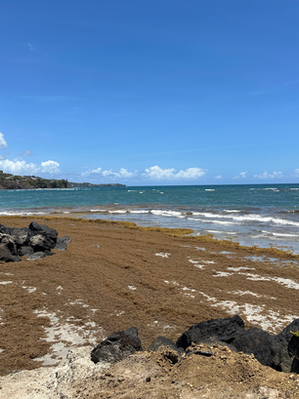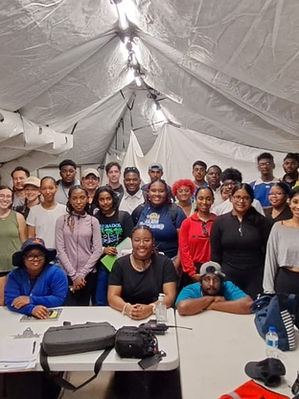Senior Practicum Research:
Flood Risk Management in Tobago
My seven-student team for my UCLA Environmental Senior Capstone Project, or "Senior Practicum," spent nine months assessing flood management solutions for susceptible communities in Tobago. Our project aimed to address existing data gaps for environmental disasters on the island and produce recommendations for Tobagonians to adapt to a changing climate that exacerbates flood risk.
We spent four months working with our stakeholders at the University of West Indies (UWI) to conduct an in-depth analysis of existing riverine flood literature, with an emphasis on remote sensing strategies for small island developing states. In March, my team and I traveled to Tobago, where we worked with more than twenty UWI students to interview Tobago residents and ground truth, or verify our remote sensing data on the ground. We collected data points at two cities, Roxborough and Castara, that enabled us to validate our geographic information system (GIS) flood susceptibility maps.
View some photos for trip highlights and stay tuned for more to come.
Project Timeline
Weeks 1-4
Weeks 5-12
Weeks 13-16
Defining the Project Scope:
Because my team pioneered Sustainability Action Research's Equity, Diversity, and Inclusion Team, I spent the first four weeks of my project reaching out to staff involved in sustainability (beyond our stakeholder Carlo Morante in Residential Life) to discuss the potential of my team and project. We ultimately decided to take a three step approach—survey, Community Conversations, and final comprehensive report—to build a foundation for future research teams to further research specific ways to implement EDI into all UCLA sustainability practices. I also researched numerous reports other Universities produced in a literature review and outlined our research framework.
Survey Methodology and Distribution:
Weeks 5-10 I met with several staff and faculty members to discuss survey methodology, scope and targeted audiences, and distribution methods. During week 11-12 the survey was released to over 200 different student organizations involved with sustainability and underrepresented groups in sustainability in addition to different departments and faculty members. My team and I applied for and received funding from The Green Initiative Fund to compensate students taking the survey through a gift-card lottery system, and received 127 student responses over the course of two weeks.
Community Conversations:
In order to get more in depth feedback on survey results, my team held three focus groups on race and ethnicity, gender and sexuality, and class and socioeconomic status dubbed “Community Conversations” to encourage an open dialogue with students. I facilitated the largest group discussion on gender and sexuality with five students to understand how their identities influenced their interactions with sustainability at UCLA.
Weeks 16-20
Comprehensive Report and Deliverable:
I spent the final five weeks of the project summarizing the key takeaways from my team's 20 weeks of research in a comprehensive report that covers the whole methodology process, survey planning, specific studying of the three underrepresented groups, and suggestions to make UCLA sustainability more equitable. We also created an abridged deliverable that is more interactive and accessible to all students, staff, and faculty.

Equity, Diversity, and Inclusion Team Member
Research Deliverables:
Want to see more? Check out the Sustainability Action Research Website
Sustainability Action Research–Equity, Diversity, & Inclusion
Through this two quarter research class, I developed vital experience designing a research framework to assess equity, diversity, and inclusion (EDI) in sustainability at UCLA. As the first Sustainability Action Research (SAR) team investigating EDI, my peers and I faced several challenges conceptualizing the project scope and specific methodology to produce meaningful results.
Additionally, the entire project was conducted remotely, which required creative communication strategies with my team members and different campus stakeholders. Please browse the linked deliverables or the below steps to learn more about the specific research I conducted and how I worked to overcome project obstacles.
Project Timeline
Weeks 1-4
Weeks 5-12
Weeks 13-16
Defining the Project Scope:
Because my team pioneered Sustainability Action Research's Equity, Diversity, and Inclusion Team, I spent the first four weeks of my project reaching out to staff involved in sustainability (beyond our stakeholder Carlo Morante in Residential Life) to discuss the potential of my team and project. We ultimately decided to take a three step approach—survey, Community Conversations, and final comprehensive report—to build a foundation for future research teams to further research specific ways to implement EDI into all UCLA sustainability practices. I also researched numerous reports other Universities produced in a literature review and outlined our research framework.
Survey Methodology and Distribution:
Weeks 5-10 I met with several staff and faculty members to discuss survey methodology, scope and targeted audiences, and distribution methods. During week 11-12 the survey was released to over 200 different student organizations involved with sustainability and underrepresented groups in sustainability in addition to different departments and faculty members. My team and I applied for and received funding from The Green Initiative Fund to compensate students taking the survey through a gift-card lottery system, and received 127 student responses over the course of two weeks.
Community Conversations:
In order to get more in depth feedback on survey results, my team held three focus groups on race and ethnicity, gender and sexuality, and class and socioeconomic status dubbed “Community Conversations” to encourage an open dialogue with students. I facilitated the largest group discussion on gender and sexuality with five students to understand how their identities influenced their interactions with sustainability at UCLA.
Weeks 16-20
Comprehensive Report and Deliverable:
I spent the final five weeks of the project summarizing the key takeaways from my team's 20 weeks of research in a comprehensive report that covers the whole methodology process, survey planning, specific studying of the three underrepresented groups, and suggestions to make UCLA sustainability more equitable. We also created an abridged deliverable that is more interactive and accessible to all students, staff, and faculty.
How can I continue to promote equity, diversity, & inclusion?
Open Letter









